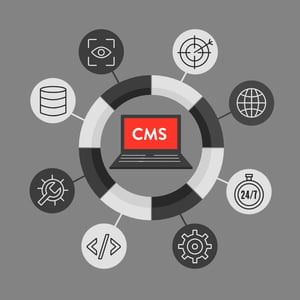 If you’ve spent any time working with a marketing team on a website you’ve probably heard the acronym “CMS” thrown around, short for Content Management System. You may even be familiar with some of the big names, such as WordPress or Joomla.
If you’ve spent any time working with a marketing team on a website you’ve probably heard the acronym “CMS” thrown around, short for Content Management System. You may even be familiar with some of the big names, such as WordPress or Joomla.
But if you’re still scratching your head trying to understand what it really is, this article will demystify the term and explain why it’s so important for a home builder website.
What is a CMS?
Back in the early days of the internet, having a website required some level of programming knowledge. And making updates usually meant working with a “webmaster” - remember those? These days most websites, from the simplest personal blogs to high-traffic news outlets, run on some form of content management system, or CMS.
This is because content management systems allow non-technical users to easily manage and update the content on a website – such as product inventory, floor plan information, community descriptions, photo galleries, and more – through a web interface that doesn’t require any coding.
While there are hundreds, if not thousands, of different CMS options on the market today, there have been a few that emerged as the major players.
The most popular content management systems
WordPress
 WordPress is perhaps the most popular and well-known CMS. It started as a blogging platform in the early-2000s, but has since come to dominate the market. WordPress currently powers roughly 33% of all websites on the internet, and nearly two-thirds of all websites running a CMS. Many people still associate WordPress with blogging, but the platform continues to grow and expand, and is used to manage some of the most highly trafficked websites on the internet.
WordPress is perhaps the most popular and well-known CMS. It started as a blogging platform in the early-2000s, but has since come to dominate the market. WordPress currently powers roughly 33% of all websites on the internet, and nearly two-thirds of all websites running a CMS. Many people still associate WordPress with blogging, but the platform continues to grow and expand, and is used to manage some of the most highly trafficked websites on the internet.
Joomla / Magento / Drupal
Joomla, Magento, & Drupal represent the biggest competition to WordPress in the arena of open-source content management software. WordPress’s ease of use has made it extremely popular among web developers and non-techies alike – but that simplicity means WordPress lacks some of the advanced features these options provide right out of the box. These enterprise-level solutions offer more powerful user management, custom layouts, and language tools – making them well-suited for e-commerce and corporate websites with large amounts of content to manage.
Squarespace / Wix
Squarespace and Wix fall into the realm of website builders – they provide drag and drop tools to create pages with a visual editor and are typically best for small businesses or personal websites that may not have the budget or resources for some of the other platforms noted here.
Most of the options listed above require you to find your own website hosting, whereas Squarespace and Wix are all-in-one hosted solutions that try to make it as easy as possible to build a website. On the downside they lack the flexibility and customizability of other options. These might work better for smaller builders than large production builders.
HubSpot
HubSpot provides a suite of products designed to help businesses manage sales and inbound marketing – including tools for social media marketing, web analytics, and search engine optimization. While HubSpot isn’t strictly a CMS, their platform has grown over the years to allow users to create everything from simple campaign pages to fully featured websites. Their content management tools enable customers to easily create pages and forms that integrate seamlessly with their marketing automation tools.
3rd party industry-specific solutions
 In addition to the options mentioned above, there are custom-built solutions specific to the new home industry. These are often part of larger product offerings that help builders manage not just their website, but the entire home building process, from scheduling and purchasing to warranties and customer service. In these cases the website may be built using their own proprietary software created in-house, or using one of the mainstream open-source options.
In addition to the options mentioned above, there are custom-built solutions specific to the new home industry. These are often part of larger product offerings that help builders manage not just their website, but the entire home building process, from scheduling and purchasing to warranties and customer service. In these cases the website may be built using their own proprietary software created in-house, or using one of the mainstream open-source options.
Building on the foundation
One of the biggest benefits to using open-source software, like WordPress, Joomla, or Magento, is the availability of what are called "plugins" or "extensions." As the name implies, you can extend the built-in functionality of your website with additional software created to serve a specific purpose. For example you can find plugins that add the ability to manage open houses and event calendars, or display photo galleries from your Flickr account.
These tools may be created and distributed free of charge by the open-source community, custom-built for your website, or purchased. The biggest CRMs today have thousands of plugins available free of charge and have spawned an entire industry built on developing and selling extensions.
What value does a CMS provide home builders?
 As you probably know building and maintaining an effective home builder website takes a lot of work. And creating a secure, easy-to-use site often requires the coordination of an entire team of people devoted to certain specialities. The right content management system, along with various plugins and extensions, can make this task just a little easier – and help maximize your marketing resources.
As you probably know building and maintaining an effective home builder website takes a lot of work. And creating a secure, easy-to-use site often requires the coordination of an entire team of people devoted to certain specialities. The right content management system, along with various plugins and extensions, can make this task just a little easier – and help maximize your marketing resources.
Valuable CMS features:
- Easily manage website content in-house - First and foremost a CMS allows your marketing team to easily manage the content on your website so it stays up-to-date and relevant to your users. Most builders are frequently expanding into new communities, releasing new floor plans, or wanting to offer users the latest photos and virtual tours. Having a CMS solution in place allows you to have a website that reflects the latest you have to offer, and keeps your users engaged.
- Extendable - Being able to integrate your website with services such as New Home Source or New Home Feed, or CRM/BRM solutions, can put you at an advantage. Many of the most popular CMS options provide plugins, or are easily extendable, to allow you to share data across various platforms for marketing automation and lead nurturing.
- Capture leads - Conversions are often at the top of any marketers list, and many content management systems allow you to add forms to your website so that users can easily request information or set an appointment to visit a model.
- Search engine optimization - Search engine optimization, or SEO, has become a specialty field that can require staying up to date on all of the latest changes to Google’s ranking algorithms and best-practices. Plugins such as Yoast SEO can make it easier to optimize your website for search engines and generate organic traffic.
- Security and privacy - Security should be a top priority for any company, and most of the popular CMS options have spent years making sure their software is secure for both you and your users. In addition to keeping you protected against hackers, many content management systems have built-in tools for managing user data and staying compliant with changing data privacy laws.
- Support - Whether through the online community, or paid technical support, it’s easy to find solutions and support to help troubleshoot issues you may encounter along the way.
Different solutions for different types of builders
Each CMS has advantages and disadvantages. The path you choose should be determined by what you're hoping to get out of your website, along with what resources you have available.
Small, custom home builders
If you’re a small, custom, builder selling less than 100 homes a year, chances are you’re not updating the content on your website as frequently as larger builders – and you may be working with a limited budget and resources. In this case you may be able to work directly with a contractor or small web shop, or look at solutions such as Houzz site designer.
Medium-to-large production builders
Builders of this size typically have a marketing manager and require their website to do more than just provide basic information to your users. When you need a dynamic, tailor-made website that generates leads and requires custom solutions, platforms such as WordPress or HubSpot provide the right level of flexibility and extendability to meet your needs.
Large builders
Builders selling more than 400 homes in a year, working in multiple markets across the country, generally have their own in-house marketing team to build, manage, and support the website. It may be necessary to integrate with third-party platforms for things like marketing automation, new home listings, and customer relationship management – making a flexible and extensible content management system a must-have. WordPress and its competitors are all viable options that provide a solid foundation for your website and all it needs to accomplish.
Now you know
Maybe you're in the process of trying to decide whether you need a new home builder website – or you have one that's already up and running. Either way, the next time you’re in a room with people talking about your website, and CMS comes up, we hope you feel better informed and understand why it's so important to the success of your online presence.
Still have questions? The Bokka Group has helped builders across the country create attractive and effective websites that are easy to use, for your customers and your team. Don't hesitate to get in touch and learn about how we can help you get the most from your website.


